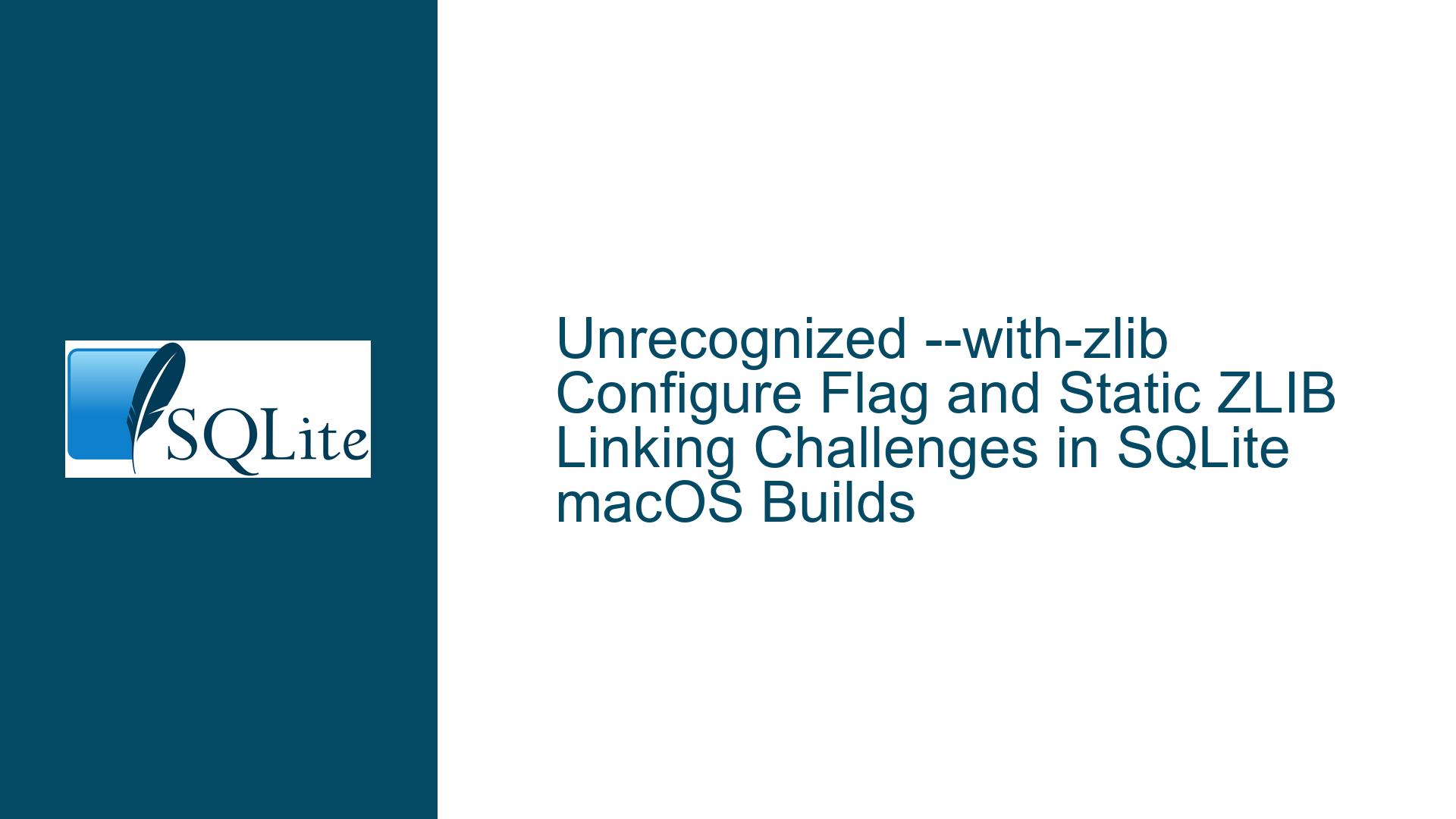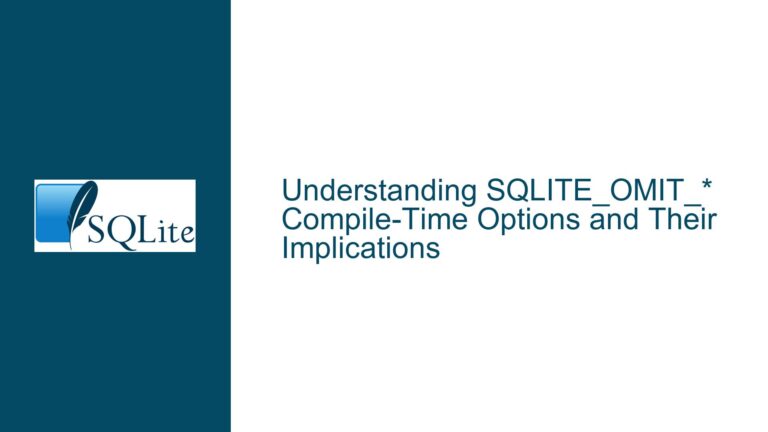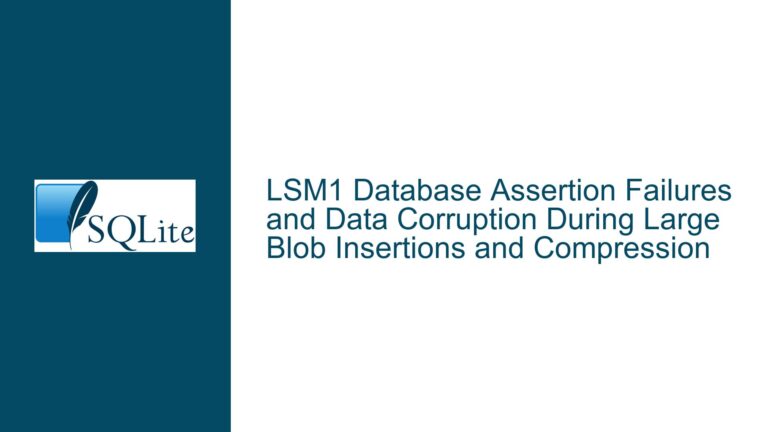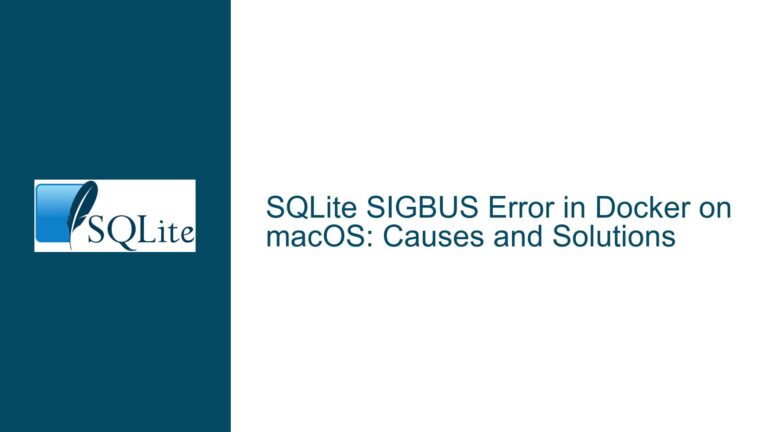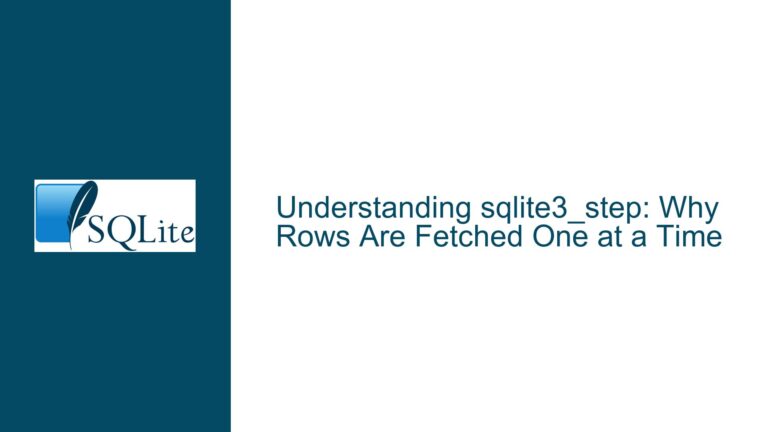Unrecognized –with-zlib Configure Flag and Static ZLIB Linking Challenges in SQLite macOS Builds
Unrecognized –with-zlib Configure Flag and Static ZLIB Linking Challenges in SQLite macOS Builds
Configuring SQLite with Custom ZLIB Fails Due to Unsupported Flags and Linker Path Issues
The core challenge arises when attempting to compile SQLite version 3.43.0 on macOS 13.5.1 with a custom statically linked zlib-1.3.0 library. The build process uses a ./configure command with the --with-zlib=/mylibl/zlib-1.3.0 flag, which triggers a warning: configure: WARNING: unrecognized options: --with-zlib. This indicates the SQLite build system does not natively support this configuration flag. Subsequent attempts to link against the custom zlib fail silently, with the build process potentially defaulting to the system-installed zlib or omitting zlib integration entirely. The macOS architecture flags (-arch x86_64 -arch arm64) and deployment target specification (-mmacosx-version-min=11.0) compound the complexity, as multi-architecture builds require precise library path handling.
Three critical factors converge here:
- SQLite’s
configurescript lacks native support for--with-zlibdirectives. - Static linking requirements (
--enable-static=yes) demand explicit control over library search paths and symbol resolution. - macOS’s system integrity protections and default library search paths interfere with custom static library integration.
The absence of error messages beyond the initial warning creates a deceptive impression of successful configuration, while the final binary may exhibit unexpected behavior due to incorrect zlib linkage. This problem is particularly acute when targeting multiple architectures (x86_64 and ARM64), as compiler flags and library paths must be validated for both architectures independently.
Root Causes: Invalid Configure Flags, Library Search Path Misconfiguration, and Static Linking Ambiguities
SQLite Configure Script Does Not Recognize –with-zlib
The SQLite Autoconf-based build system does not include a predefined --with-zlib option in its configure script. Unlike other libraries (e.g., Readline or Tcl), zlib integration in SQLite is handled implicitly through compiler and linker flags rather than explicit configure directives. Attempting to use --with-zlib will always trigger an unrecognized option warning, rendering this flag ineffective for specifying a custom zlib path. This is a common point of confusion for developers accustomed to build systems that accept --with-<library>=path conventions.
Incomplete Static Library Path Specification in CFLAGS/LDFLAGS
When static linking is enabled (--enable-static=yes), the build process requires explicit paths to both zlib header files (zlib.h) and the precompiled static library (libz.a). The original CFLAGS specification (-mmacosx-version-min=11.0 -arch x86_64 -arch arm64) focuses on architecture and deployment targets but omits critical -I and -L directives pointing to the custom zlib installation at /mylibl/zlib-1.3.0. Consequently, the compiler defaults to system header paths (e.g., /usr/include), while the linker prioritizes system library directories (/usr/lib), leading to inadvertent linking against macOS’s system zlib.
Multi-Architecture Builds Require Universal Binary Compatibility for ZLIB
The use of -arch x86_64 -arch arm64 instructs the compiler to produce a universal binary supporting both Intel and Apple Silicon architectures. However, the custom zlib library at /mylibl/zlib-1.3.0 must itself be compiled as a universal binary. If zlib was built for a single architecture, linking will fail during the final lipo step when merging object files. This architecture mismatch is not always explicitly reported by the linker, resulting in partial builds or silent fallbacks to system libraries.
Static vs. Shared Library Conflicts in Dependency Resolution
The --enable-shared=no --enable-static=yes flags instruct the build system to link SQLite statically. However, zlib’s default installation often includes both shared (libz.dylib) and static (libz.a) libraries. Linker precedence rules on macOS favor shared libraries unless explicitly overridden. Without stringent library search path controls, the build process might dynamically link against libz.dylib even when static linkage is intended. This is exacerbated when the custom zlib’s static library is not placed in a directory prioritized by the linker’s search algorithm.
Resolution Strategy: Manual ZLIB Path Specification, Build Process Auditing, and Cross-Architecture Validation
Step 1: Eliminate Unsupported Configure Flags and Switch to Manual ZLIB Configuration
Remove the invalid --with-zlib flag from the configure command. Instead, directly specify the paths to zlib headers and libraries using CFLAGS and LDFLAGS:
./configure \
CFLAGS="-mmacosx-version-min=11.0 -arch x86_64 -arch arm64 -I/mylibl/zlib-1.3.0/include" \
LDFLAGS="-L/mylibl/zlib-1.3.0/lib" \
--prefix=/mylib/sqlite-3.43.0 \
--enable-shared=no \
--enable-static=yes
The -I/mylibl/zlib-1.3.0/include flag ensures the compiler locates the custom zlib headers, while -L/mylibl/zlib-1.3.0/lib directs the linker to the static library directory. Verify that /mylibl/zlib-1.3.0/lib contains libz.a and that no conflicting libz.dylib resides in the same directory.
Step 2: Validate ZLIB Build Configuration for Multi-Architecture Support
Recompile zlib-1.3.0 as a universal binary to ensure compatibility with both x86_64 and ARM64 architectures. Use the following commands:
cd zlib-1.3.0
./configure --static --prefix=/mylibl/zlib-1.3.0
make CFLAGS="-mmacosx-version-min=11.0 -arch x86_64 -arch arm64"
make install
This produces a universal libz.a in /mylibl/zlib-1.3.0/lib. Confirm using lipo -archs /mylibl/zlib-1.3.0/lib/libz.a, which should output x86_64 arm64.
Step 3: Enforce Static Linking and Override System Library Preferences
Append -static to LDFLAGS to enforce static linking, though note that macOS’s linker ignores this flag by default. Instead, explicitly reference the static library using -l:libz.a:
LDFLAGS="-L/mylibl/zlib-1.3.0/lib -l:libz.a"
This syntax (-l:filename) bypasses standard library lookup rules, directly linking against libz.a instead of searching for libz.dylib.
Step 4: Audit the Generated Makefile for Correct Compiler and Linker Flags
After running configure, inspect the generated Makefile for correct flag propagation:
grep -E "CFLAGS|LDFLAGS" Makefile
The output should include -I/mylibl/zlib-1.3.0/include in CFLAGS and -L/mylibl/zlib-1.3.0/lib -l:libz.a in LDFLAGS. If not, manually edit the Makefile to add these flags.
Step 5: Execute Build with Verbose Output to Diagnose Linker Behavior
Run make V=1 to observe the exact compiler and linker commands. Scrutinize the output for references to zlib:
cc -mmacosx-version-min=11.0 -arch x86_64 -arch arm64 -I/mylibl/zlib-1.3.0/include -c sqlite3.c
cc -mmacosx-version-min=11.0 -arch x86_64 -arch arm64 -I/mylibl/zlib-1.3.0/include -o sqlite3 sqlite3.o -L/mylibl/zlib-1.3.0/lib -l:libz.a
Ensure that both compilation and linking phases reference the custom zlib paths. If system zlib headers or libraries are used instead, revisit the CFLAGS and LDFLAGS configuration.
Step 6: Verify the Linked ZLIB Version in the SQLite Binary
After building, use otool and nm to confirm static linkage to the custom zlib:
otool -L sqlite3
This should not display libz.dylib. To confirm static linkage, inspect symbols:
nm sqlite3 | grep inflate
The output should include zlib functions like inflate, indicating static inclusion of zlib in the SQLite binary.
Step 7: Address macOS System Library Caching and Path Hardening
macOS caches library paths in shared library caches, which can override explicit linker directives. Disable this temporarily during testing:
export DYLD_LIBRARY_PATH=/mylibl/zlib-1.3.0/lib
However, since static linking negates runtime library dependencies, this step is primarily diagnostic. If dynamic linkage persists despite static flags, investigate the zlib build configuration for inadvertent shared library generation.
Step 8: Cross-Validate Using a Minimal Test Program
Create a test program zlibtest.c:
#include <zlib.h>
#include <stdio.h>
int main() {
printf("ZLIB version: %s\n", zlibVersion());
return 0;
}
Compile against the custom zlib:
cc -mmacosx-version-min=11.0 -arch x86_64 -arch arm64 -I/mylibl/zlib-1.3.0/include -L/mylibl/zlib-1.3.0/lib -l:libz.a zlibtest.c -o zlibtest
Run ./zlibtest to verify the expected zlib version (1.3.0). If successful, the SQLite build environment is misconfigured; if not, the zlib installation is faulty.
Step 9: Rebuild SQLite with Amalgamation Disabled to Isolate ZLIB Usage
SQLite’s amalgamation build (sqlite3.c) may internalize certain dependencies. Disable amalgamation to expose zlib linkage:
./configure --disable-amalgamation ...
Rebuild and inspect intermediate object files for zlib references:
nm sqlite3.o | grep inflate
This helps isolate whether zlib usage originates from SQLite core code or build system integrations.
Step 10: Final Deployment and Runtime Testing
After a successful build, deploy the SQLite binary to a clean environment without the custom zlib paths. Execute compression-related functions (e.g., SELECT zipfile(...);) to validate functionality. Use dtruss on macOS to monitor system calls and ensure no dynamic loading of zlib occurs.
By systematically addressing flag misconfiguration, static linking ambiguities, and multi-architecture requirements, the SQLite build can be successfully integrated with a custom static zlib on macOS. This process underscores the importance of explicit path specification, build process transparency, and post-build validation in complex compilation environments.
